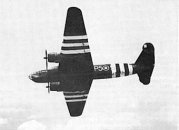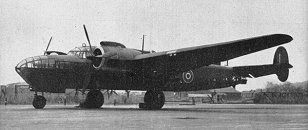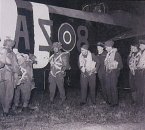
Armstrong Whitworth Albemarle
The Armstrong Whitworth Albemarle was an all wood and metal construction due to the anticipated alloy shortage. Designed by Bristol and manufactured by A.W. Hawkesley Ltd, the Albemarle evoked little enthusiasm in its original role as a medium bomber. By the time it had been introduced, bomber development had advanced at such a pace that it was rendered obsolete even before it entered service.
Instead, it was found to be more useful in transport and glider-tug duties for Britain's special forces. The Albemarle first saw action in 1943 where it was used in a glider-tow role over Sicily.
Another famous episode for the RAF's Albemarles came in June 1944, when four squadrons of the aircraft towed the Horsa gliders that took Allied airborne troops to France for the first time during Operation Overlord, the invasion of occupied Europe. Later the same year, two squadrons provided glider-tugs during the assault on the Rhine bridges at Arnhem.
The anticipated light alloy shortage did not occur and Britain's aircraft factories escaped relative unscathed by the German Blitz. Thus the Albemarle design was not to have the significance it might otherwise have had.
The Soviet Union was the only other Albemarle operator, although it has been suggested that the country was only interested in the aircraft's engines, which it is thought to have been copied later. Albemarle production ended in December 1944 after 602 of an ordered 1060 had been built.
Test pilot John Grierson described the Albemarle as an average aircraft, with no virtues and no vices. The first 32 built were intended for use as reconnaissance bombers, with a crew of two pilots, a navigator and a radio operator. However, the Albemarle was never operated in this role.
 |
 |
 |
| An Albemarle bearing invasion stripes of Operation Overlord (D-Day). |
The Albemarle was easily dismantled and transported aboard standard road trailers. It consisted mainly of steel and plywood covering. |
British airborne troops during Operation Overlord. |
|
Armstrong Whitworth Albemarle (Technical Specification) |
| Role |
Special Forces Transport |
| Manufacturer |
Armstrong Whitworth |
| Maximum Speed |
426 kmh (264 mph) |
| Maximum Range |
2,092 km (1,300 miles) |
| Ceiling |
5,486 meters (18,000 feet) |
Weight
Empty
Maximum Takeoff |
6,800 kg (14,960 lbs)
16,556 kg (36,423 lbs) |
Dimensions
Wingspan
Length
Height
Wing Area |
23.47 meters (77 ft)
18.26 meters (59 ft, 11 in)
4.75 meters (15 ft, 7 in)
74.65 square meters (803 sq ft) |
| Engines |
Two Bristol Hercules XI radial piston engines each providing 1,186-kW (1,590 hp) |
| Armament |
Four 7.7mm machine guns in a Boulton Paul dorsal turret or two 7.7mm machine guns amidships. |
| Number Built |
602 |
Photo Gallery
Click here to submit your photo
| Have A Passion For Aircraft? |
Subscribe to our 14 series FREE newsletter
delivered weekly on World War 2 Aircraft factfile... |
| NB:- We hate spam as much as you do, so your email address will NEVER be shared with or sold to anyone else. That's a Guarantee. |
|
|





